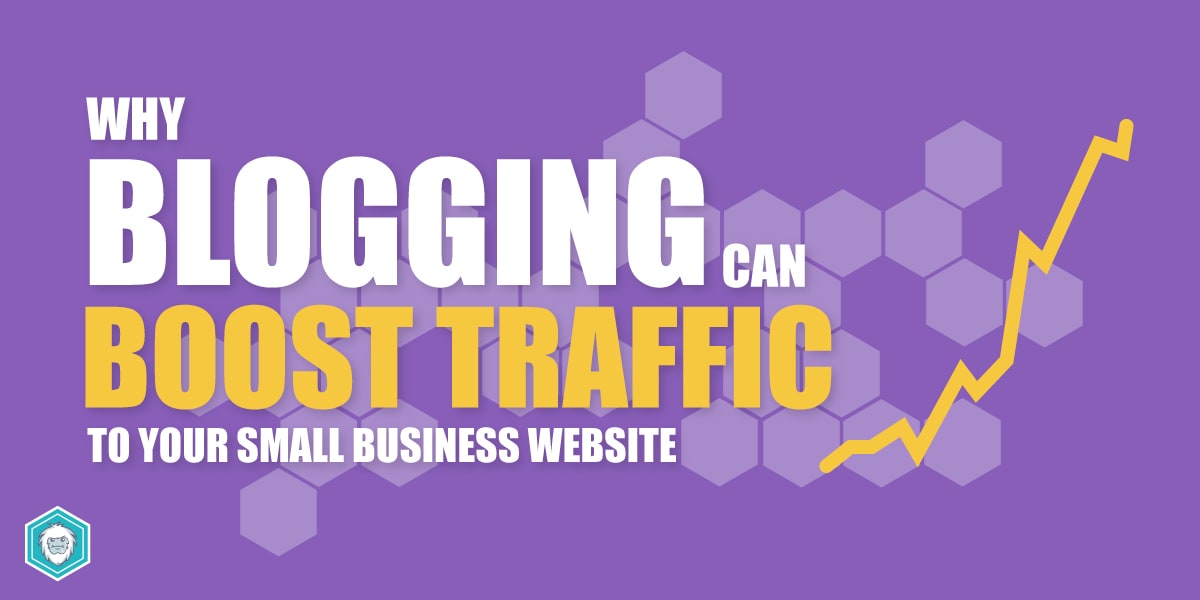Why Blogging Can Boost Traffic to Your Small Business Website
Regularly blogging is key to boosting your business’s online visibility in search engines and to potential customers. A blog on your website is essential for connecting with visitors and attracting potential new business opportunities.
One of the most affordable ways to drive traffic is by improving your search engine rankings through regular blogging.
In this post, we’ll explore why blogging is important for small businesses, how it can improve traffic to your website, and the best practices for using a blog to enhance your SEO and attract more potential customers.

Key Takeaways
- Increases Organic Traffic: Blogging can help your website rank higher in search engines, driving more organic traffic to your site.
- Establishes Authority: Consistently posting insightful content positions your business as an expert in your field, building trust with your audience.
- Improves SEO: Regular blog updates with relevant keywords enhance your SEO strategy, making it easier for potential customers to find you online.
- Engages Your Audience: Blogs provide a platform to connect with your audience, answering their questions and providing useful insights.
- Generates Leads: Well-researched and insightful blog posts can act as lead magnets, in turn encouraging your visitors to subscribe to your email list or download extra resources.
1. Blogging Improves SEO and Search Engine Rankings
One of the benefits of blogging is boosting your SEO. Search engines like Google like new, relevant, and high-quality content.
When you publish regular blog posts or content on your business’s website, search engines index them and recognize your website as an active, informative resource. This can help improve your position on search engine results pages (SERPs), making it easier for potential customers to discover your business.
How Blogging Improves SEO:
- Increases Keyword Opportunities: By writing blog posts about topics relevant to your business, you can target a variety of long-tail keywords. These keywords are often less competitive than short-tail keywords but can still drive highly targeted traffic to your website. For instance, if you sell outdoor heaters, you might write blog posts targeting keywords like “eco-friendly heating” or “outdoor heaters for patios”.
- Fresh Content for Search Engines: Google undoubtedly favors websites that regularly update their content. Each time you publish a new blog post, you tell search engines that your website is still actively updated. This can help increase your visibility and improve your search engine rankings.
- Internal Linking Opportunities: Blogging gives you the chance to create internal links that point to other pages on your website. For example, you can link to your product or service pages within relevant blog posts. Internal linking your blog posts helps search engines determine the focus of your website and improves the visibility of key pages.
2. Blogging Builds Brand Authority and Trust
Blogging allows small businesses to showcase their specific expertise and build brand authority in their field.
By providing valuable insights, tips, and information, you demonstrate your knowledge to your audience, positioning yourself as a trusted resource.
How Blogging Builds Brand Authority:
- Educates Your Audience: Blogging allows you to educate your target audience on topics that matter to them. Whether it’s offering tips, industry news, or product tutorials, your blog can provide helpful, relevant content that builds trust with readers. Over time, as people find your content useful, they’ll begin to see you as an expert in your field.
- Humanises Your Brand: Blog posts provide a unique opportunity to show the personality behind your business. Think about sharing personal stories and customer success stories to help create a stronger brand connection with your audience.
- Encourages Engagement: By encouraging readers to make comments on your blog posts or share them on social media, you foster engagement with your audience. When a new user interacts with your content, they are more likely to recommend your brand via word-of-mouth marketing or make a potential purchase.

Related: Best Blogging Platforms
3. Blogging Helps You Connect with Your Audience
Blogging is a great way to connect with your audience and keep them engaged, helping develop a deeper relationship with them. Through blog posts, you can learn about the interests and preferences of your customers, tailor your content to solve their problems and respond to their needs.
How Blogging Connects You with Your Audience:
- Provides Solutions to Problems: Blogging allows you to give solutions to common questions or challenges your customers face. Simply offering solutions and helpful information can show that you understand your customer’s needs, increaasing customer satisfaction and brand loyalty.
- Encourages Feedback and Interaction: A blog is a great platform for starting conversations with your customers. When you get users to comment and form discussions on your posts, you receive valuable feedback and insight into your audience’s preferences. You can use this information to improve the products and services you offer, as well as the overall customer experience.
- Personalized Content: Personalized content can drive more engagement and increase the likelihood of conversion. Blogging gives you the flexibility to create content tailored to different segments of your audience. If your business attracts multiple customer profiles, you can create blog posts that cater to each profile’s unique interests and needs. .
4. Blogging Drives Traffic through Social Media Sharing
Sharing your blog posts on social media platforms is a cost-effective way to help drive traffic to your website. Social media is an influential tool for increasing your online footprint and reaching a wider audience.
Top Tip: Sharing blog posts on social media platforms like Facebook, X, LinkedIn, Pinterest, and Instagram can help you attract new visitors to your business.
How Blogging Can Help Drive Social Media Traffic:
- Shareable Content: If your blog posts provide value to your audience, they are more likely to share them with their followers, which can lead to increased website traffic. Creating shareable content, such as infographics, how-to guides, or industry insights, can help increase your reach.
- Engagement and Visibility: Every time you share a post on social media, it increases the odds of you engaging with your audience. Social media platforms give you the opportunity to interact with readers, answer questions, and encourage further discussion about your blog post, helping to provide more traffic to your website.
- Build a Community: Consistently sharing blog posts on social media helps you create followers who are interested in your content. Over time, these followers can become repeat visitors to your website, further driving traffic and improving your SEO.

5. Blogging Can Increase Conversion Rates
Blogging doesn’t just drive traffic—it can also help convert visitors into customers. When you provide helpful, informative content, you’re nurturing your leads , helping to guide them through the customer journey.
Integrating calls to action (CTAs) in your blog posts helpsencourage readers to do something, whether that’s sign up for a newsletter, make a purchase, or contact you for more details.
How Blogging Improves Conversion Rates:
- Call to Action (CTA): Each blog post should have a clear and relevant CTA that directs readers to do something. Whether you’re promoting a product, offering a free resource, or inviting readers to contact you, CTAs can help drive conversions from your blog traffic.
- Nurturing Leads: Blog posts are an excellent way to nurture leads by providing them with valuable content at different stages of their buyer’s journey. You can teach leads how to solve their problems, which can move them closer to making a purchase decision.
- Building Trust: When customers trust your brand, they are more likely to make a purchase. This is where high-quality, informative blog posts come in, helping strengthen trust and make an impact.
Related: Essential Tools for Content Creators and Bloggers
6. Blogging Provides Long-Term Benefits
One of the most significant benefits of blogging is its long-term effect on your website’s SEO. Unlike other forms of online marketing, blog posts have a long shelf life.
Once published, a blog post can continue to attract traffic for months or even years, depending on the quality and relevance of the content.
How Blogging Provides Long-Term Benefits:
- Evergreen Content: Creating evergreen content—content that remains relevant over time—ensures that your blog posts continue to drive traffic long after they’re published. For example, a blog post about “Common Mistakes to Avoid When Starting a Small Business” will continue to attract new visitors as long as it’s relevant and helpful.
- SEO Value: High-quality blog posts targetting long tail keywords can continually rank in search engines helping bring in new visitors to your website. Over time, the accumulated SEO value of your blog posts can significantly improve your website’s overall search engine visibility.
- Reputation and Authority: Blogging helps establish your business as a trusted authority in your niche. As you consistently publish valuable content, your website earns credibility, and your audience begins to rely on you for industry insights and advice.

Summing Up
Blogging is an essential tool for any small business looking to boost traffic to its website, improve search engine rankings, and build a strong relationship with its customer base.
When you create valuable, informative content that showcases your expertise it helps to build trust, guiding potential customers through their buyer’s journey.
Blogging also provides long-term benefits, including increased SEO value and higher conversion rates while giving you the ability to drive ongoing traffic to your site.
To reap the full benefits of blogging, focus on creating high-quality, relevant content and using keywords effectively. Marketing your posts through social media and other channels is also key to success.
Over time, blogging will boost your website traffic and help you grow your brand and business.




